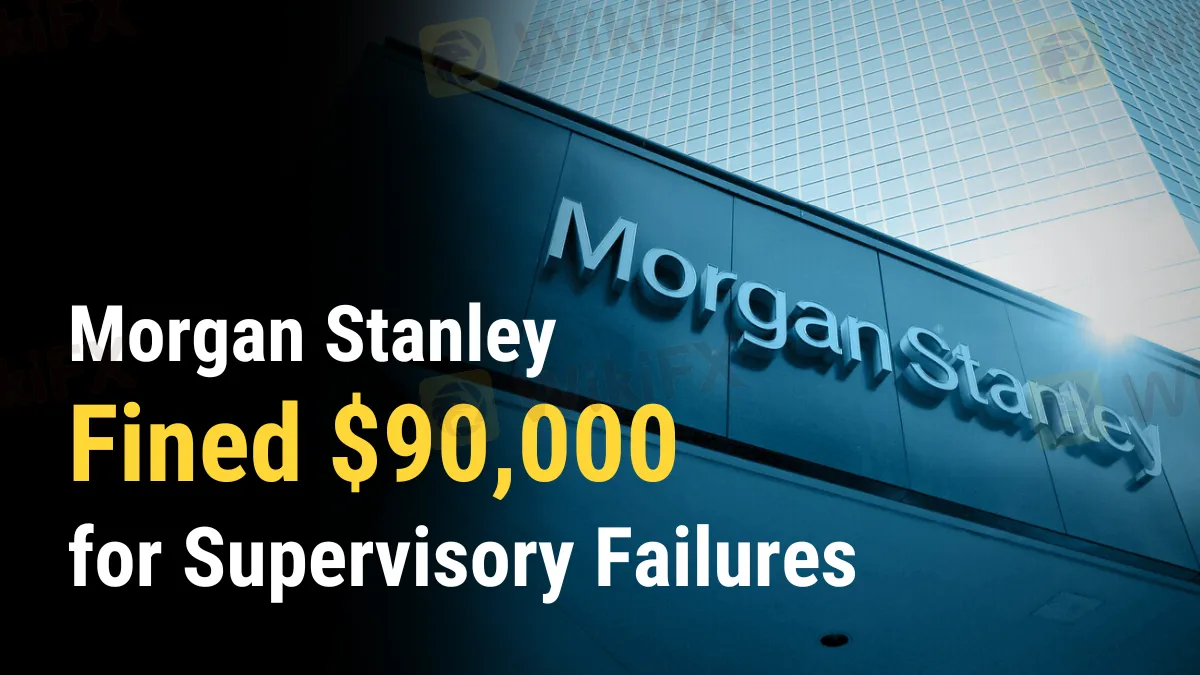简体中文
繁體中文
English
Pусский
日本語
ภาษาไทย
Tiếng Việt
Bahasa Indonesia
Español
हिन्दी
Filippiiniläinen
Français
Deutsch
Português
Türkçe
한국어
العربية
Morgan Stanley Fined $90,000 for Supervisory Failures
Abstract:Morgan Stanley was fined $90,000 for failing to supervise employee trading activities on NEX SEF, underscoring the importance of robust oversight in financial markets.

On April 17, 2024, the NEX SEF punished Morgan Stanley for its inability to effectively oversee a worker's trading actions on the platform from January to May 2021. The results showed that to move positions across his controlled Morgan Stanley accounts, the trader made self-matched transactions on the NEX SEF. The non-deliverable forward instruments traded in these deals were the Indian Rupee, Indonesian Rupiah, Korean Won, Malaysian Ringgit, and Taiwan Dollar.
Although Morgan Stanley received a warning from the NEX SEF on the dubious activity, its control and monitoring procedures proved to be inadequate in detecting and halting the ongoing self-matching transactions. The Panel concluded that the participant's failure to monitor the behavior of their employees and agents on the platform infringed under NEX SEF (legacy) Rule 407(h).
Morgan Stanley did not acknowledge or refute the factual findings or rule breaches in response to the disciplinary action. Nevertheless, they agreed to a settlement that included a monetary penalty of $90,000. This penalty serves as a poignant reminder of the paramount need for robust supervision and compliance protocols inside financial institutions.

The instance highlights how difficult it is for regulatory agencies to maintain market integrity and stop wrongdoing, especially when it comes to computerized trading. The intricate dynamics of financial markets require constant attention to detail from companies to prevent security lapses and preserve investor trust.
Other market players should take note of this disciplinary action against Morgan Stanley, which emphasizes the serious consequences of inadequate supervision. To identify and stop fraudulent activity and ultimately protect the integrity and stability of the financial markets, it highlights the vital role that efficient monitoring and surveillance systems play.
Investment in strong compliance infrastructure and training programs must be given top priority by financial institutions as regulatory scrutiny increases and technology continues to change trading practices. Mitigating operational risks and guaranteeing regulatory compliance need proactive steps to improve oversight and monitoring capabilities.
Finally, the financial sector should take note of Morgan Stanley's disciplinary action as a reminder of the need for strict oversight and compliance with legal requirements. Through the process of assiduously analyzing these occurrences, market players will be able to preserve the integrity of the world's financial markets and promote a transparent and accountable culture.

Disclaimer:
The views in this article only represent the author's personal views, and do not constitute investment advice on this platform. This platform does not guarantee the accuracy, completeness and timeliness of the information in the article, and will not be liable for any loss caused by the use of or reliance on the information in the article.
Read more

Risk Involved with Cabana Capital – Every Trader Should Know
Cabana Capital has changed its name and logo, basically everything about its identity. This seems a bit suspicious, and it's something you should definitely be concerned about. In this article, you’ll learn about the red flags that every trader needs to watch out for.

CME International Records a Massive Jump in Forex Volumes
CME International recorded a record surge in its foreign exchange trading volumes during the second quarter. Check out its performance across products and markets.

Scam Brokers Exposed! FCA Warns Traders to Stay Safe
If you are into forex trading, you need to protect your money from investment scams. Many scam brokers are active in the market now. The FCA, a reputed financial regulator, has issued a list of unlicensed brokers you need to stay away from.

Interactive Brokers Launches IBKR InvestMentor App for Beginners
Interactive Brokers introduces IBKR InvestMentor, a new mobile app delivering free, interactive investing lessons for beginners and aspiring investors.
WikiFX Broker
Latest News
Alchemy Markets Review 2025: Key Facts and Insights
FXPRIMUS: 5 Things They Don’t Want You to Know
Temasek's portfolio scales new peak even as divestments hit over 2-decade high
5 Serious Warnings About Mirrox! You Can’t Afford to Ignore
Exposing Trade Capital Limited - Siphoning Millions, Restricting Withdrawals, Charging Extra Fees
How Do I Place a Stop-loss Order?
Largest Market Makers
Bitcoin rises to fresh record above $112,000, helped by Nvidia-led tech rally
Stock futures are little changed after S&P 500 posts first winning session in three: Live updates
Nvidia briefly touched $4 trillion market cap for first time
Currency Calculator


